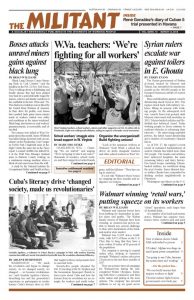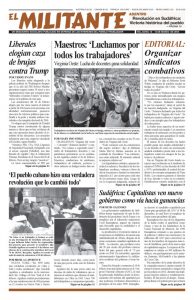Coal miners and their families in Novogrodivka, in part of Donetsk province outside Moscow-backed separatist control, rallied outside the bosses’ office there Feb. 14, blocking entrance to the building. The workers demanded payment of wages owed to them. When they didn’t get a response, they cut off roads into and out of the city
Their fight is part of broader efforts by miners in Ukraine to push for payment of outstanding wages, for raises, and for safer working conditions. Some 18 miners have been killed on the job over the past year. Victories won in some recent fights have strengthened their union, the Independent Trade Union of Miners of Ukraine (NPGU).
After deciding to put up round-the-clock picketing, the Novogrodivka miners built a tent camp and installed heating. The mine is part of the state-owned company Selydivvuhillia, which also runs the Kotlyarevskoho, Kurakhivka and Ukraina mines. Workers in those mines joined the protest.
Miners from all four units held a joint rally in Novogrodivka Feb. 15 and announced they had formed a joint strike committee. They said they were going to Kiev, the capital, to demand a meeting with Prime Minister Vladimir Groisman.
The next day, Deputy Prime Minister Volodymyr Kistion announced the government had transferred 365 million hryvnia ($13.6 million) to the state coal enterprises, earmarked for paying back wages to workers. This falls far short of the overall pay arrears of 945 million hryvnia owed coal miners. And the 90 million hryvnia allocated to the Selydivvuhillia-owned mines doesn’t even cover half of wages owed to workers there.
Miners and leaders of the NPGU left for Kiev and met Feb. 21 with Igor Nasalik, minister of the Energy and Coal Industry. The meeting produced “zero results,” the union reported.
“There will be no pay if there is no work,” Nasalik declared. “And first of all, pass the word to the miners’ wives so they know.”
The nine-member workers’ delegation responded by sitting in at the ministry, announcing an indefinite hunger strike until all arrears are paid. On Feb. 25, the chairman of the Free Trade Union of Medical Workers, Oleg Panasenko, came to the ministry to provide the strikers with medical assistance. Meanwhile, the workers at the four mines have ended their walkouts.
“Wages must be paid on time,” Valery Mamchenko, deputy chair of the former state-sponsored Trade Union of Coal Industry Workers of Ukraine, said in a statement supporting the miners. “Last year 2.8 billion hryvnia was allocated for the development of the coal industry, including the wage fund, but this year the amount is less than half.”
Both federations are affiliated to the IndustriAll Global Union, whose general secretary, Valter Sanches, demanded Ukraine’s prime minister back the miners’ “legitimate demands.”
The Militant has reported on the recent round of battles by Ukrainian workers, particularly in underground mines, fighting for back wages and workers’ rights. The mine bosses at the Ingulskaya uranium mine took 94 miners to court for “illegal striking” in November, after workers staged an underground protest demanding a 50 percent wage increase and improved working conditions. After the union mobilized supporters from mines across the region to join them in court, the judge threw the case out Feb. 9.
“The union has been involved in a growing number of strikes and court cases,” Sergei Barabashuk, union leader at the Evraz iron ore mine in Kryvyi Rih, told the Militant in January. “We’re winning many of these fights.”
The union federation put a picture of the Militant with its article on the union’s fight in Kryvyi Rih and Ingulskaya on its website, translating extensive quotes from its coverage. With the growing combativity and strength of the union, Barabashuk reported company harassment has increased. “We want to let workers around the world know about this, so we are in a better position to defend ourselves,” he said.

